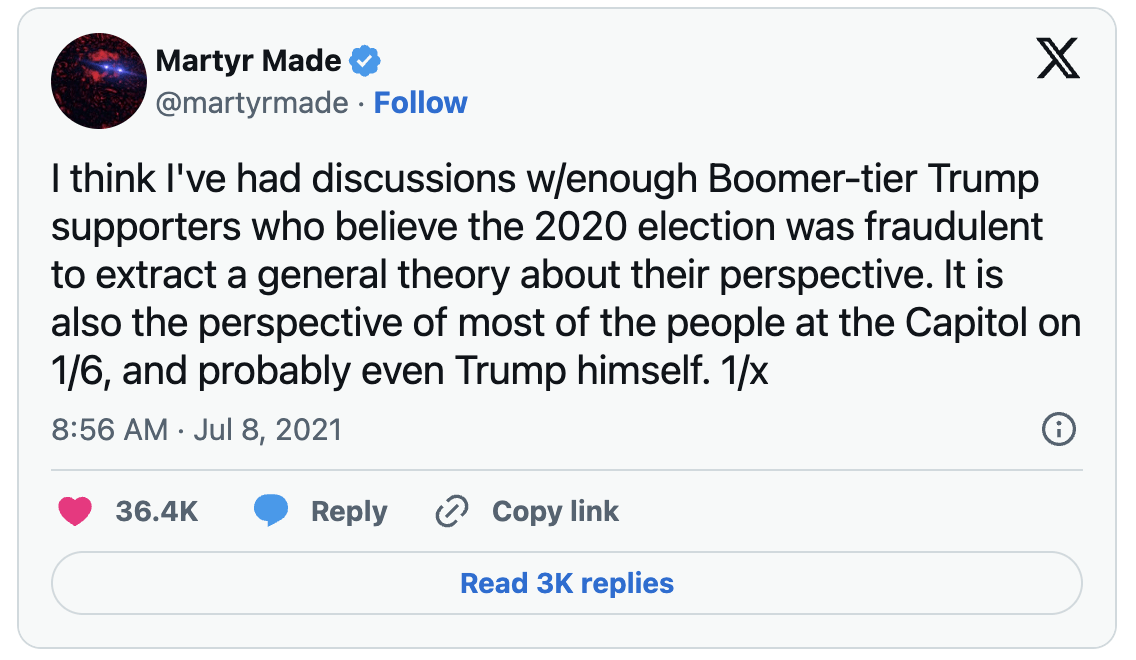Darryl Cooper — aka Martyrmade — has had a whirlwind of a couple of weeks.
For those who don't know Cooper, he is a Twitter personality and podcaster who wades into some weighty subject matter. I first found him from a tweet that went viral back in 2021, which resonated with me so absolutely that I had to give him a follow.
From there, I saw he was a history buff and had a podcast exploring complicated, deep, interesting topics that I have seen very few people explore.
I started to listen and became hooked.
Cooper's material is long. Some series go on for about 30 hours of podcast time. Don't let the length fool you, though; they are engaging in a way that I have yet to experience with history material. He explores topics with such incredible nuance and detail that you almost feel like you're there. He dives deep into each side's motivations, bringing the events to life in such vivid detail that you feel right in the middle of it all.
Shilling for him aside, I wasn't the only one who became hooked and wanted to share his content. Joining me was Tucker Carlson, who had him on his podcast, talking to him about a wide array of subjects.
However, there was a particular spot in his podcast that caused quite a stir: Cooper's thoughts on WWII.
Without diving into specifics, Cooper's analysis of WWII veered into territory that challenged some of the widely accepted narratives about the war. He predicted the backlash, noting that certain topics have become untouchable, akin to mythic lore. And sure enough, the media response was swift and harsh.
The backlash was unnecessary and deeply disappointing, especially from some personalities I admire. For me, the most grotesque response was from Niall Ferguson.
The subject matter of the response aside, the way he responded, and the attacks he threw at Cooper were the most disappointing. I have no issue with historians who want to challenge his thoughts on the merits, but interestingly, to do that alone was rare. To start his response to Cooper, Ferguson talks of Tucker Carlson's description of Cooper as
"the most important popular historian working in the United States today"
as ridiculous because
"...when I went to look for his books. There are none."
So yeah, Cooper is a charlatan because he hasn't written any books.
But as someone who likes and respects Niall — I have read two of his books, The Accent of Money and Civilization — I can say that as a historian, I can't recall a single thing from him.
Unfortunately, I couldn't repeat one piece of information, insight, or overarching point he was trying to convey in either of those books. Although, I'll be the first to admit that I am sure they were well-researched and elegantly put together.
While I respect Ferguson's research, his books felt distant and dry, like they were more concerned with academic posturing than engaging the reader. In contrast, Cooper's work draws you in emotionally, giving the history real weight and relevance.
For example, I will always remember Fear & Loathing in New Jerusalem by Cooper. I listened to all 26 hours- the equivalent of any book- and was hooked for two weeks straight.
You can almost feel that it hurts him to get into the minds of those in the middle of these conflicts. The passion seems genuine, which makes the content much more accessible to digest and trust. Cooper doesn't just teach history; he makes you feel the weight of it.
He made me fully appreciate how complex the issues in the Middle East were in a way that made me actually feel educated on the subject. Interestingly, I didn't come out choosing a side, either. I came out understanding why we are here where we are today and why there are such passionate voices on both sides, which, for me, is far more significant.
So yeah, sure — he hasn't written any books 🤷♂️. But is that what the goal of a historian should be? To write books? No, obviously not. A historian's role isn't just to churn out books or pile up credentials; it's to help people understand the complexities of the past and foster empathy for those who lived through it. For me, a good historian answers this question:
How did I help the audience better understand the complexities of the period I'm teaching, fostering empathy for the challenges and perspectives of the people of that time?
And with that goal, Cooper does that as well as anyone.
Sometimes, I am unpleasantly reminded that even though they rail against their tactics, the conservatives can fall just as easily into the elitism of academic credentialism as progressives.
Ironically, starting his argument with those cheap attacks made me roll my eyes rather than want to take his criticisms seriously. Ferguson's critique reflects a broader issue within academic circles—an overemphasis on credentials at the expense of real engagement or value-add with audiences and source material. But as the way we consume information shifts, so too must our understanding of what makes a historian valuable.
At the end of the day, we shouldn't measure historical understanding by credentials or publications alone. It's about fostering empathy, grappling with nuance, and helping people grasp the complexities of the past. By that measure, Darryl Cooper is as much a historian as anyone—whether or not he's written a book. In a world where we increasingly consume information through podcasts and social media, perhaps the future of history looks a lot more like Darryl Cooper's work—engaging, empathetic, and free from the constraints of academia.


